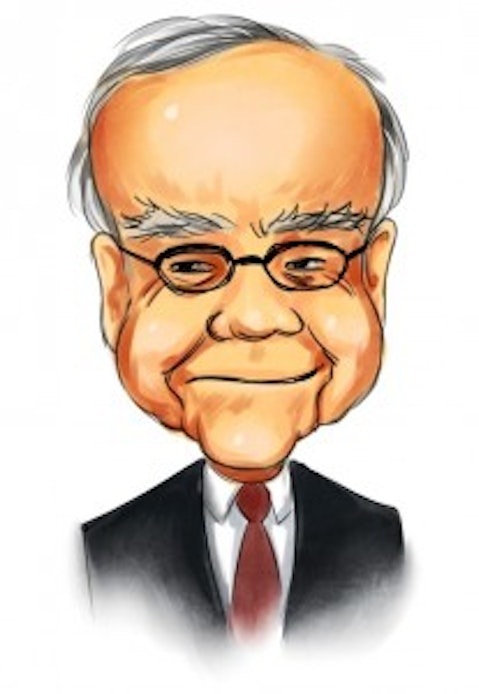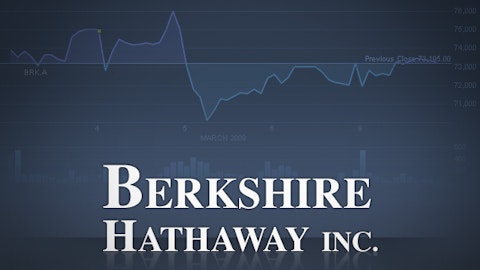
The stocks have performed decently over the past year, but with Procter trading for 18 times a fairly flat-lined earnings stream one can see why a little profit taking makes sense. Johnson & Johnson (NYSE:JNJ) has also rallied nicely and seems to have put the lid on last year’s “quality control” mess at its factories — at least for now. Johnson & Johnson (NYSE:JNJ) is trading for 23 times earnings, which is quite a premium to the 11 times earnings multiple that the stock fetched just a year or two ago when the stock was trading with a fifty dollar handle.
Now don’t get me wrong, Buffett is a true perma-bull because it’s worked pretty well for him over the years and because he has to be – the capital gains alone in his portfolios would be enough to bail out most struggling state governments let alone all of the delinquent municipalities in California combined. Clearly, nobody (including the billionaires) wants to write Victorville, California officials a check right now and Buffett knows better than to go to all or mostly cash. Timing the market is certainly not Buffett’s core competency.
Berkshire Hathaway Inc. (NYSE:BRK.A) biggest holdings recently included a 20% position in Wells Fargo and a 19.3% position in The Coca-Cola Company (NYSE:KO). The man knows how to bet big when he sees opportunity and is not “scared money” by any means with 40% of Berkshire Hathaway Inc. (NYSE:BRK.A)’s money in just two stocks and 57% or so of the firm’s portfolio in just three names. The Oracle shows how concentrated investing in the best companies pays the biggest dividends. On the other hand, 99% of mutual fund managers over the past ten years failed to beat the S&P index fund.
With that type of concentration, Buffett may be raising some cash and prepping for a sell off. It makes perfect sense after such a strong performance in all three of his largest names. After all, stocks don’t go straight up forever, and knowing when to sell is a highly important facet of Buffett’s investment strategy. When IBM dropped 10% after its recent earnings, the news media reported that Berkshire Hathaway Inc. (NYSE:BRK.A) lost $1.2 billion from the recent highs. Buffett himself probably didn’t care what happened to the price of the stock as much as what is going on with the operations of the underlying business at IBM. On that front, things looked pretty good for Big Blue with the forward earnings multiple pegged at 11 times analyst-projected EPS.
I don’t expect Buffett to dump IBM any time soon, and I don’t think he is bearish on the overall market here (that’s like asking a Zebra to lose the stripes). Buffett is always on the hunt for big game. His purchase of Burlington seems to make a ton of sense in retrospect and one should probably take him at his word that he wants to bag a big deal this year. The Heinz deal will likely provide a stable and predictable cash flow stream for Berkshire Hathaway Inc. (NYSE:BRK.A) and should be accretive to the conglomerate’s earnings immediately. Prior to dating Heinz with his buddies at 3G Capital, Buffett lamented that he “pursued a couple of elephants, but came up empty-handed.”
The smartest investor of our age is likely lightening up to rebalance his portfolio, gather up a bigger war chest to hunt gigantic elephants with (sounds a little like a Wild At Heart episode but I digress), or hold cash to wait for better bargains in the marketplace. Buffett is the savviest steward of capital ever, and this move is likely a reflection on current valuations to some degree – many of the names he sold have rallied handsomely, yet other wide moat businesses have not participated to the same degree as the overall market.
Buffett also sold most of his position in GE at the end of last year, but he made plenty of buys along the way as well. Some of his notable sales last year included 25% of his Visa Inc (NYSE:V) holding, 16% of his ConocoPhillips (NYSE:COP) holding, and most of his Kraft Foods Group Inc (NASDAQ:KRFT) holding. He blamed poor performance for hitting the eject button. Buffett has long said he would never sell a share of Coke and I take him at his word. Long-term investing, after all, is a game of patience.
All in all, Buffett is someone who never let’s skepticism keep him out of the stock market. Even when he closed his partnerships and bought an ailing textile firm he was still “all in” on the US equity market. Don’t expect him to start shorting Netflix, Inc. (NASDAQ:NFLX) and Salesforce.com even though their market multiples suggest the stocks are extremely overvalued. Hedging is simply not Mr. Buffett’s style, and his style is clearly working.
The article Is Buffett Bullish? originally appeared on Fool.com.
Copyright © 1995 – 2013 The Motley Fool, LLC. All rights reserved. The Motley Fool has a disclosure policy.

